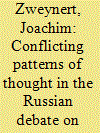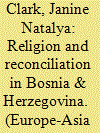| Srl | Item |
| 1 |
ID:
096240


|
|
|
|
|
| Publication |
2010.
|
| Summary/Abstract |
Pension reform is among the most economically pressing and politically controversial issues worldwide. Numerous countries have achieved noteworthy results, but for others overcoming opposition to reform remains an elusive task. This article argues that opposition does not necessarily come from the left, but also from parties connected with privileged occupational groups. Focusing on a distinction between the diffuse and concentrated costs of reform, the article analyses the formation of pro-reform and anti-reform coalitions in a two-dimensional space and discusses how particular configurations of the party system relate to reform outcomes and sustainability. The argument is tested using legislative roll call data from Poland.
|
|
|
|
|
|
|
|
|
|
|
|
|
|
|
|
| 2 |
ID:
096239


|
|
|
|
|
| Publication |
2010.
|
| Summary/Abstract |
This article is a continuation of two essays by the same author on Soviet and Russian economic debates between 1987 and 2002 published in Europe-Asia Studies in 2006 and 2007. In the most recent phase of these debates, between 2003 and 2007, as in previous phases, the questions raised went far beyond the usual realm of economics. The questions raised included whether Russia should attempt to become a 'Western' country marked by democracy and a market economy serving the individual interests of its citizens or whether it was more important to become a great power again; whether Western patterns of political and economic life are suitable for Russia or whether the attempt to import foreign institutional structures is doomed to failure, making it necessary for Russia to find her own way. The discussion here is based on a qualitative content analysis of the most important economic journals and selected monographs.
|
|
|
|
|
|
|
|
|
|
|
|
|
|
|
|
| 3 |
ID:
096242


|
|
|
|
|
| Publication |
2010.
|
| Summary/Abstract |
This article examines how the Hungarian crisis and Soviet interventions strengthened the position of the Romanian communist leadership. First, it eroded the respect of several Bucharest officials for the Soviet army, reinforcing their desire to see Soviet troops leave Romania. Second, the crisis brought back memories of earlier historical events that seemed to provide 'proof' of Hungarian bellicosity, which the Romanian leadership used to discriminate against ethnic Hungarians in Romania. Third, the crisis aroused fears of Transylvanian irredentism, which Bucharest used to control the population. Fourth, by incarcerating Imre Nagy, Bucharest leaders could witness his suffering, which motivated them to avoid his fate.
|
|
|
|
|
|
|
|
|
|
|
|
|
|
|
|
| 4 |
ID:
096244


|
|
|
|
|
| Publication |
2010.
|
| Summary/Abstract |
The article explores the question of whether and how religion is being used in Bosnia & Herzegovina (BiH) to promote and foster reconciliation. Based primarily on 20 semi-structured interviews with representatives of the three main faiths in BiH-Islam, Orthodoxy and Catholicism-the article's central contention is that religion is a potentially valuable, yet fundamentally under-utilised peace-building tool in BiH.
|
|
|
|
|
|
|
|
|
|
|
|
|
|
|
|
| 5 |
ID:
096241


|
|
|
|
|
| Publication |
2010.
|
| Summary/Abstract |
This article reports on a survey examining sources of income and their effects on the mental health and subjective quality of life of residents in nine rural Russian regions. Using conventional measures of depressed mood and respondents' assessments of the quality of their lives in different domains, the authors find that the emergence of a mixed economy, that generates income from salary and wages and household enterprises, as well as government transfers, has produced differentiation in the subjective psychological as well as material quality of rural residents' lives.
|
|
|
|
|
|
|
|
|
|
|
|
|
|
|
|
| 6 |
ID:
096243


|
|
|
|
|
| Publication |
2010.
|
| Summary/Abstract |
This article addresses orientations towards place and opportunities for rural-urban and inter-regional migration amongst graduates of vocational colleges in Ul'yanovsk Oblast'. Given the inaccessibility of the housing market and decline in the provision of student and workplace accommodation, kinship networks have become the principal means to negotiate any form of migration. However, while in some cases such networks provide 'bridges' to opportunities elsewhere, a general lack of networks, alongside the 'bonding' effects of kinship networks at the local level, acts as a significant constraint on young peoples' prospects for geographical, and social, mobility.
|
|
|
|
|
|
|
|
|
|
|
|
|
|
|
|